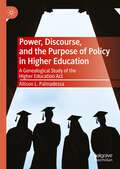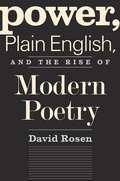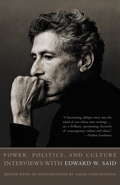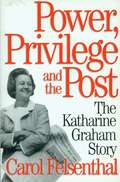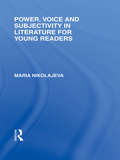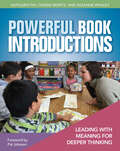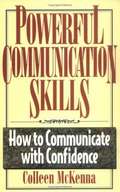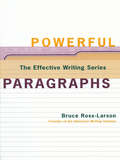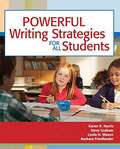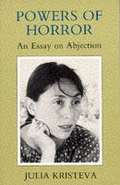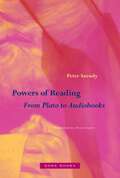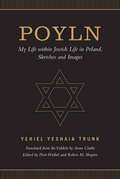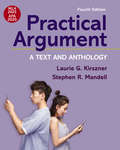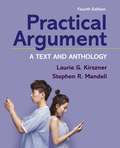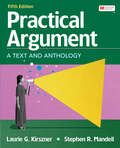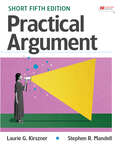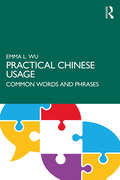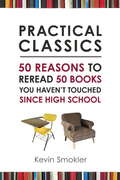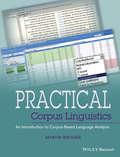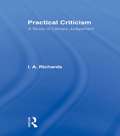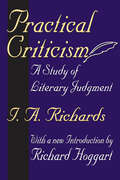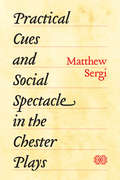- Table View
- List View
Power, Discourse, and the Purpose of Policy in Higher Education: A Genealogical Study of the Higher Education Act
by Allison L. PalmadessaThis book traces the full history of the Higher Education Act of 1965 in its entirety, to the present. The fifty-six-year history of this landmark legislation is analyzed as a genealogical phenomenon through multiple methodological and theoretical frameworks. This allows the researcher to study the Act not in a linear or single approach, rather the blend of lenses and methods creates a means to study policy-making as a site of ideological reproduction and results in the exposure of power dynamics that obfuscate the hidden agenda by those in positions of power.
Power, Ethics, and Ecology in Jewish Late Antiquity
by Julia Watts BelserRabbinic tales of drought, disaster, and charismatic holy men illuminate critical questions about power, ethics, and ecology in Jewish late antiquity. Through a sustained reading of the Babylonian Talmud's tractate on fasts in response to drought, this book shows how Bavli Taʿanit challenges Deuteronomy's claim that virtue can assure abundance and that misfortune is an unambiguous sign of divine rebuke. Employing a new method for analyzing lengthy talmudic narratives, Julia Watts Belser traces complex strands of aggadic dialectic to show how Bavli Taʿanit's redactors articulate a strikingly self-critical theological and ethical discourse. Bavli Taʿanit castigates rabbis for misuse of power, exposing the limits of their perception and critiquing prevailing obsessions with social status. But it also celebrates the possibilities of performative perception - the power of an adroit interpreter to transform events in the world and interpret crisis in a way that draws forth blessing.
Power, Plain English and the Rise of Modern Poetry
by David RosenDavid Rosen offers a radically new account of modern poetry and revises our understanding of its relation to Romanticism. British poets from Wordsworth to Auden attempted to present themselves simultaneously as persons of power and as moral voices in their communities. The modern lyric derives its characteristic complexities--psychological, ethical, formal--from the extraordinary difficulty of this effort. The low register of our language--a register of short, concrete, native words arranged in simple syntax--is deeply implicated in this story. Rosen shows how the peculiar reputation of "plain English" for truthfulness is employed by Modern poets to conceal the rift between their (probably irreconcilable) ambitions for themselves. With a deep appreciation for poetic accomplishment and a wonderful iconoclasm, Rosen sheds new light on the innovative as well as the self-deceptive aspects of Modern poetry. This book alters our understanding of the history of poetry in the English language.
Power, Politics, and Culture: Interviews with Edward W. Said
by Edward W. SaidEdward Said has long been considered one of the world's most compelling public intellectuals, taking on a remarkable array of topics with his many publications. But no single book has encompassed the vast scope of his stimulating erudition quite like Power, Politics, and Culture, a collection of interviews from the last three decades. In these twenty-eight interviews, Said addresses everything from Palestine to Pavarotti, from his nomadic upbringing under colonial rule to his politically active and often controversial adulthood, and reflects on Austen, Beckett, Conrad, Naipaul, Mahfouz, and Rushdie, as well as on fellow critics Bloom, Derrida, and Foucault. The passion Said feels for literature, music, history, and politics is powerfully conveyed in this indispensable complement to his prolific life's work.
Power, Privilege and the Post: The Katherine Graham Story
by Carol FelsenthalKatharine Graham's story has all the elements of the phoenix rising from the ashes, and in Carol Felsenthal's unauthorized biography, Power, Privilege, and the Post, Graham's personal tragedies and triumphs are revealed. The homely and insecure daughter of the Jewish millionaire and owner of The Washington Post, Eugene Myer, Kay married the handsome, brilliant and power hungry Phillip Graham in 1940. By 1948 Kay's father had turned control of The Washington Post over to Phil, who spent the next decade amassing a media empire that included radio and TV stations. But, as Felsenthal shows, he mostly focused on building the reputation of the Post and positioning himself as a Washington power-player. Plagued by manic depression, Phil's behavior became more erratic and outlandish, and his downward spiral ended in 1963 when he took his own life. Surprising the newspaper industry, Kay Graham took control of the paper, beginning one of the most unprecedented careers in media history. Felsenthal weaves her exhaustive research into a perceptive portrayal of the Graham family and an expert dissection of the internal politics at the Post, and a portrait of one of a unique, tragic, and ultimately triumphant figure of twentieth-century America.
Power, Voice and Subjectivity in Literature for Young Readers (Children's Literature and Culture)
by Maria NikolajevaThis book considers one of the most controversial aspects of children’s and young adult literature: its use as an instrument of power. Children in contemporary Western society are oppressed and powerless, yet they are allowed, in fiction written by adults for the enlightenment and enjoyment of children, to become strong, brave, rich, powerful, and independent -- on certain conditions and for a limited time. Though the best children’s literature offers readers the potential to challenge the authority of adults, many authors use artistic means such as the narrative voice and the subject position to manipulate the child reader. Looking at key works from the eighteenth century to the present, Nikolajeva explores topics such as genre, gender, crossvocalization, species, and picturebook images. Contemporary power theories including social and cultural studies, carnival theory, feminism, postcolonial and queer studies, and narratology are also considered, in order to demonstrate how a balance is maintained between the two opposite inherent goals of children’s literature: to empower and to educate the child.
PowerPoint, Communication, and the Knowledge Society
by Hubert KnoblauchPowerPoint has become an integral part of academic and professional life across the globe. In this book, Hubert Knoblauch offers the first complete analysis of the PowerPoint presentation as a form of communication. Knoblauch charts the diffusion of PowerPoint and explores its significance as a ubiquitous and influential element of contemporary communication culture. His analysis considers the social and intellectual implications of the genre, focusing on the dynamic relationships between the aural, visual and physical dimensions of PowerPoint presentations, as well as the diverse institutional contexts in which these presentations take place. Ultimately, Knoblauch argues that the parameters of the PowerPoint genre frames the ways in which information is presented, validated and absorbed, with ambiguous consequences for the acquisition and transmission of knowledge. This original and timely book is relevant to scholars of communications, sociology and education.
Powerful Book Introductions: Leading with Meaning for Deeper Thinking
by Kathleen Fay Chrisie Moritz Suzanne WhaleyEffective book introductions during guided reading set the stage for young readers to navigate new texts independently and successfully and often shape the outcome of small-group lessons. Many teachers struggle with decisions about what these introductions should address, what they should include, and how to conduct them. Powerful Book Introductions: Leading with Meaning for Deeper Thinking literacy leaders Kathleen Fay, Chrisie Moritz, and Suzanne Whaley speak to these concerns by taking a close look at the purposeful planning that goes into preparing for this small but vital part of today's guided reading lessons. Through relatable classroom examples and the wisdom of their shared teaching experiences, the authors show you how to: Select texts for your small-group lessons specifically based on your students' needsAmplify meaning-making from the first moments of your guided reading book introductions and maintain this emphasisIntroduce visual and structural information to support your readers in meaning-makingNo matter where you are in your understanding of guided reading, Powerful Book Introductions will help you as you learn to craft student-centered, meaning-driven book introductions that prepare your readers for success.
Powerful Communication Skills: How To Communicate With Confidence
by Colleen MckennaGood communication skills are fundamental to all relationships and your key to business success. How you communicate your thoughts and feelings to others and how you manage your differences are predictors of the quality of your relationships at home or at the office. When individuals don't speak clearly, listen accurately or assert themselves effectively, the result is reduced profit, diminished self-esteem and lowered company morale. The purpose of this book is to provide you with ways to enhance your communication skills and increase your effectiveness.People need to be able to call upon a sophisticated set of interpersonal skills to reach their communication goals and to help others reach theirs. This book is designed to facilitate practical communication skills that complement teamwork, interdependence and shared responsibility, which are the benchmarks of successful businesses and corporations today.
Powerful Forces: Assessment Pack (Great Minds Wit & Wisdom #Grade 1, Module 3)
by Ann Brigham Lauren Chapalee Sara ClarkeNIMAC-sourced textbook
Powerful Paragraphs (The Effective Writing Series)
by Bruce Ross-LarsonWhether you are composing a Web page on the Internet or agonizing over an annual budget report, these books are the key to clarity, accuracy, and economy in any writing task. Explores the essentials of solid, point-based paragraphs, with chapters on unifying each paragraph around one point, developing paragraphs in a variety of interesting ways, binding sentences within the paragraph, and creating smooth transitions. A catalog of exemplary paragraph patterns, supported with clear diagrams, gives readers models to follow and options to consider.
Powerful Writing Strategies For All Students
by Linda Mason Karen Harris Ed.D. Steve Graham Ed.D. Barbara FriedlanderFinally—highly effective, field-tested lesson plans for the students in every elementary and middle school classroom who struggle with writing. The practical how-to follow-up to Graham and Harris's popular Writing Better, this book is just what K–8 educators need to advance all students' writing skills, whether they have learning disabilities or just need extra help. Teachers will get concise lesson plans they can use to easily supplement their existing writing curriculum. From 20 to 50 minutes each, the lessons address types of writing that are key to academic success, such as writing reports and constructing essays for standardized tests help with every phase of the writing process, from planning to revising reinforce new skills through group and individual practice ensure that improvements are sustained by teaching students critical self-regulation skills they can use independently support effective instruction with step-by-step guidelines and optional scripts for teachers engage students with mnemonic devices they'll immediately grasp and remember include fun photocopiable support materials, such as cue cards, picture prompts, sheets for graphing story parts, and charts for brainstorming and setting goals Firmly grounded in the authors' Self-Regulated Strategy Development approach, which has been proven effective by 2 decades of research, these brief, powerful lessons will help transform struggling students into confident, skilled, and motivated writers.
Powers Of Horror: An Essay on Abjection
by Julia Kristeva Leon S. RoudiezPowers of Horror is an excellent introduction to an aspect of contemporary French literature which has been allowed to become somewhat neglected in the current emphasis on para-philosophical modes of discourse.
Powers of Reading: From Plato to Audiobooks
by Peter SzendyA historical, literary, and philosophical study that transforms our understanding of reading"Peter Szendy offers a subtle, persuasive, and unprecedented account of the time of reading and its scene of address, one that is as archaic as it is contemporary. When we read, are we listening to a voice or being read to? If it is not a private and monologic exercise, how do we understand the populated scene of reading? What reads when we read, and how does reading push and pull between temporalities and voices? Why do we keep leaving the text when we seek to obey the injunction to stay within its terms?Questions such as these produce a fresh, even startling, consideration of a wide range of literary and popular texts, including Hobbes&’ Leviathan, Flaubert&’s Madame Bovary, Kant&’s moral injunctions, Sade, Valéry, Blanchot, and de Certeau, but also modern fiction, film, audiobooks, and hypertext. The power of reading turns out to belong to its surprising engagement with time and direction: the deliberate reader stays close but strays, tries to fill in the gaps but gets pushed back by a countercurrent. The key to the text is sought &‘outside&’ only to be led back to the text and its failure to deliver a final answer. Equally at odds with older versions of literary formalism that insist on the self-referentiality of the text as well as contextualists who scour an external social order to discover the truth of the text, Szendy approaches that very conflict as an oscillation constitutive of reading itself. Paradoxically, reading is sustained precisely by what interrupts its teleological flow.The result is a comic, profound, and timely reconceptualization of reading which rushes forward only to find itself pushed back into the heart of the text, which discovers that this incessant breaking from the text, this headlong rushing ahead to the world outside the text is a sequence of overreach, delay, and return that forms the ragged rhythm of reading itself. Powers of Reading is a patient, brilliant, and illuminating inquiry into the crosscurrents of voice and address, one that speaks to the speed and complexity of our time, how we are upended by our forward propulsions, to consider how multiple voice, action, and passivity are all rearranged in the scene of reading." –Judith Butler, Distinguished Professor in the Graduate School, University of California, Berkeley
Poyln: My Life within Jewish Life in Poland, Sketches and Images
by Yehiel Yeshaia TrunkOriginally published between 1944 and 1953, Poyln (Poland) is one of the treasures of Yiddish literature. Despite its reputation, the book has not been fully translated into English until now. Written by Yehiel Yeshaia Trunk, a prominent Polish Jewish writer, Poyln is a colourful epic, a moving testimony, and an important primary historical source that presents a portrait of Polish Jewry against the backdrop of the Nazi genocide. The undisputed hero of the story is the national community of Polish Jews. To portray this community, Trunk creates a rich gallery of characters - Hassidic patricians, timber merchants, rich landowners, brilliant Talmudists, Orthodox rabbis, and Hasidic tsadikim. He also depicts ordinary village and small-town Jews, artisans, shopkeepers, workers, and Luftmenschen, all of them members of one extended family. Particularly valuable aspects of Poyln are its examination of different trends in the Hasidic movement and the author's attempt to bridge the gap between his secular generation and its religious ancestors. In short, Trunk's work aims to show Jewishness as a way of life. This is the first instalment of a multi-volume edition of Poyln, the first English translation to be published. Here begins a story of the beauty and pathos of the world of Polish Jewry, a world that was almost totally destroyed by the Nazis.
Practical Argument with 2020 APA and 2021 MLA Updates: A Text and Anthology
by Laurie G. Kirszner Stephen R. MandellThis ebook has been updated to provide you with the latest guidance on documenting sources in MLA style and follows the guidelines set forth in the MLA Handbook, 9th edition (April 2021).More than ever, successful argumentation is a major part of academic success—and has plenty of real-world application. But students don’t benefit when they are bogged down with technical jargon and abstraction. That’s where Practical Argument comes in. Bestselling authors Laurie Kirszner and Stephen Mandell make argumentative writing accessible with a scaffolded, step-by-step approach to convey what students need to know about argument, in understandable language. The Fourth Edition includes an even more contemporary and diverse array of readings, as well as new coverage of the kinds of visual arguments students are likely to encounter in their everyday lives.
Practical Argument: A Text And Anthology
by Laurie G. Kirszner Stephen R. MandellBest-selling authors Laurie Kirszner and Stephen Mandell have brought simplicity to the study of argument with the third edition of Practical Argument. A straightforward, full-color, accessible introduction to argumentative writing, the text employs an exercise-driven, step-by-step approach to get to the heart of what students need to understand both classical and contemporary argument. Practical Argument foregoes the technical terminology that confuses students and explains concepts in understandable, everyday language, with examples that are immediately relevant to students' lives.
Practical Argument: A Text and Anthology
by Laurie G. Kirszner Stephen R. MandellPractical Argument‘s expert step-by-step approach helps students become more accomplished argument writers.
Practical Argument: Short Edition
by Laurie G. Kirszner Stephen R. MandellPractical Argument makes argument accessible by avoiding technical jargon and emphasizing how arguments are constructed and written in terms of contemporary issues students recognize and care about.
Practical Chinese Usage: Common Words and Phrases
by Emma L. WuPractical Chinese Usage offers post-beginner to near advanced students of Chinese a guide to the most frequently misused and confusing words in the language. Entries are arranged in alphabetical order for ease of reference Sample sentences with pinyin and English translations are provided after each explanation Examples of typical mistakes made by students are clearly marked throughout Each entry is annotated in accordance with the New HSK guidelines, indicating the level of difficulty Practical Chinese Usage provides students of Chinese with the necessary tools to refine their use of expressions and synonyms in order to communicate effectively in the Chinese language.
Practical Classics: 50 Reasons to Reread 50 Books You Haven't Touched Since High School
by Kevin SmoklerWhat do the great books of your youth have to say about your life now? Remember reading Catcher in the Rye and The Great Gatsby in high school? How about Slaughterhouse-Five and Pride and Prejudice? Would you read them again now that no one's grading you, just for your own enjoyment? This book helps you decide to do just that. This author will guide you through fifty books commonly assigned in high school English class and show you why you'd probably enjoy rereading the same books as an adult. Smokler's essays on the classics-witty, down-to-earth, appreciative, and insightful-are divided into ten sections, each covering an archetypical stage of life-from youth and first love to family, loss, and the future. The author not only reminds you about the essential features of each great book but gives you a practical, real-world reason why revisiting it in adulthood is not only enjoyable but useful. Can The Adventures of Huckleberry Finn help you cope with aging? What does To Kill a Mockingbird have to say about being a parent? How about Fahrenheit 451 on not getting stuck in a crappy job? Practical Classics gives you an incentive to reread and a reason why.
Practical Corpus Linguistics
by Martin WeisserThis is the first book of its kind to provide a practical and student-friendly guide to corpus linguistics that explains the nature of electronic data and how it can be collected and analyzed. Designed to equip readers with the technical skills necessary to analyze and interpret language data, both written and (orthographically) transcribed Introduces a number of easy-to-use, yet powerful, free analysis resources consisting of standalone programs and web interfaces for use with Windows, Mac OS X, and Linux Each section includes practical exercises, a list of sources and further reading, and illustrated step-by-step introductions to analysis tools Requires only a basic knowledge of computer concepts in order to develop the specific linguistic analysis skills required for understanding/analyzing corpus data
Practical Criticism V 4: A Study Of Literary Judgment
by I. A RichardsThis is Volume four of ten of the selected works of I.A. Richards from 1919 to 1938. Originally published in 1929, this study looks at literary judgement. The ‘Practical Criticism’ experiment began to take shape in late 1923. A. C. Benson, then Master of Magdalene College, records in his diary for the 13th of October ‘that at dinner Richards had suggested as a good examination for English students to print five extracts of poetry and prose, with no clue as to author and date, and containing one really worthless piece – and ask for comments and opinion’. This volume is the evidence of that experiment.
Practical Criticism: A Study of Literary Judgment
by I. A. RichardsLinguist, critic, poet, psychologist, I. A. Richards (1893-1979) was one of the great polymaths of the twentieth century. He is best known, however, as one of the founders of modern literary critical theory. Richards revolutionized criticism by turning away from biographical and historical readings as well as from the aesthetic impressionism. Seeking a more exacting approach, he analyzed literary texts as syntactical structures that could be broken down into smaller interacting verbal units of meaning. Practical Criticism, fi rst published in 1929, is a landmark volume in demonstrating this method.
Practical Cues and Social Spectacle in the Chester Plays
by Matthew SergiAmid the crowded streets of Chester, guild players portraying biblical characters performed on colorful mobile stages hoping to draw the attention of fellow townspeople. In the fifteenth and sixteenth centuries, these Chester plays employed flamboyant live performance to adapt biblical narratives. But the original format of these fascinating performances remains cloudy, as surviving records of these plays are sparse, and the manuscripts were only written down a generation after they stopped. Revealing a vibrant set of social practices encoded in the Chester plays, Matthew Sergi provides a new methodology for reading them and a transformative look at medieval English drama. Carefully combing through the plays, Sergi seeks out cues in the dialogues that reveal information about the original staging, design, and acting. These “practical cues,” as he calls them, have gone largely unnoticed by drama scholars, who have focused on the ideology and historical contexts of these plays, rather than the methods, mechanics, and structures of the actual performances. Drawing on his experience as an actor and director, he combines close readings of these texts with fragments of records, revealing a new way to understand how the Chester plays brought biblical narratives to spectators in the noisy streets. For Sergi, plays that once appeared only as dry religious dramas come to life as raucous participatory spectacles filled with humor, camp, and devotion.
